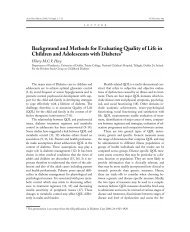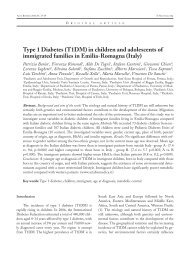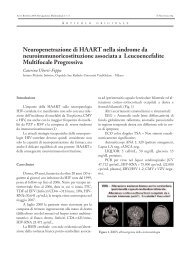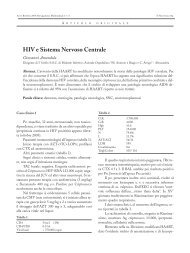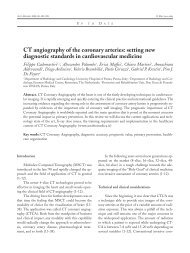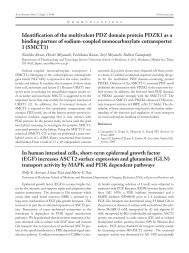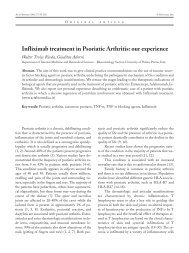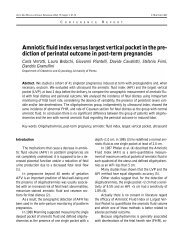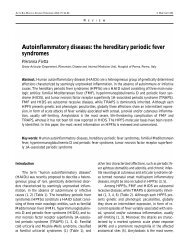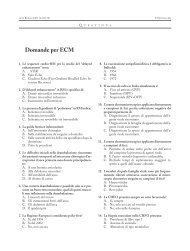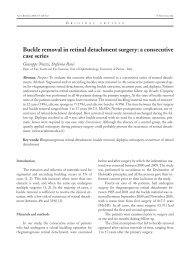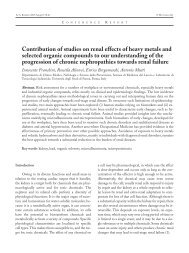Moral pain and senility1 - Acta Bio Medica Atenei Parmensis
Moral pain and senility1 - Acta Bio Medica Atenei Parmensis
Moral pain and senility1 - Acta Bio Medica Atenei Parmensis
Create successful ePaper yourself
Turn your PDF publications into a flip-book with our unique Google optimized e-Paper software.
ACTA BIO MED 2005; 76; 53-59 © Mattioli 1885<br />
L E C T U R E<br />
<strong>Moral</strong> <strong>pain</strong> <strong>and</strong> senility 1<br />
Carlo Maggini<br />
Department of Neuroscience, Section of Psychiatry, University of Parma, Parma, Italy<br />
1. The term moral <strong>pain</strong>, used in the popular lexicon<br />
to indicate a condition which pertains to the anthropological<br />
dimension, has since decades been excluded<br />
from psychiatric terminology to be replaced by<br />
psychopathological categories such as sadness, melancholia<br />
<strong>and</strong> depressed mood, <strong>and</strong> by diagnostic nosographic<br />
ones such as depression or depressive disorder.<br />
Thus, for the psychiatrist who may be lacking in historical<br />
memory, the term moral <strong>pain</strong> has a vague <strong>and</strong><br />
literary meaning, rather than a scientific one. For a<br />
long time, however, this term has been identified with<br />
a specific technical notion, which overcoming <strong>and</strong><br />
transcendence have been fundamental in the historical<br />
<strong>and</strong> epistemological metamorphosis of psychiatry as a<br />
science. The concept of moral <strong>pain</strong> refers back to the<br />
cultural heritage of the writings of the 19 th century<br />
which, by now buried in the libraries of psychiatric<br />
hospitals, still survive the pillaging of occasional visitors<br />
(1).<br />
With the birth of psychiatry as a medical <strong>and</strong> naturalistic<br />
discipline, that is, at the beginning of the 19 th<br />
century, the term moral <strong>pain</strong> had its reason for being in<br />
that, being opposed to physical <strong>pain</strong>, it marked the<br />
boundary between general medicine <strong>and</strong> psychiatry<br />
<strong>and</strong> between medicine of the body <strong>and</strong> medicine of<br />
the soul (of the psyche), thus laying the foundation of<br />
the identity of psychiatry.<br />
The ab<strong>and</strong>onment of the term moral <strong>pain</strong> was due<br />
both to the disengagement of psychiatry from medicine<br />
<strong>and</strong> neurology, which has progressively moved the<br />
models of mental illness away from the semeiotics of<br />
neurological sensitivity, as well as the more spiritual interpretation<br />
of the term moral which, like the word<br />
soul, has become a category of the humanistic, ethnical-philosophical,<br />
sociological <strong>and</strong> religious disciplines,<br />
<strong>and</strong> more <strong>and</strong> more unrelated to the natural sciences.<br />
As a consequence, the noun <strong>pain</strong> <strong>and</strong> the adjective<br />
moral ended by diverging, as did the semantic areas<br />
they defined, placed on the opposite sides of medicine<br />
<strong>and</strong> neurology, <strong>and</strong> philosophy <strong>and</strong> religion, becoming<br />
words that are estranged from psychiatry.<br />
Once, psychiatry, delineated by its clinical field,<br />
developed conceptual psychopathological framework,<br />
<strong>and</strong> autonomous terminology, allowed for an ab<strong>and</strong>onment<br />
of the term moral <strong>pain</strong> as a mere stigma of<br />
the birth of psychiatry itself.<br />
2. However even today the term moral <strong>pain</strong> appears,<br />
albeit infrequently, in psychiatric literature as a<br />
synonym of human misery <strong>and</strong> of emotional-affective<br />
suffering, which lies beyond the borders of taxonomic<br />
systems <strong>and</strong> eludes their diagnostic schemes.<br />
The term moral <strong>pain</strong> refers only in part to mild,<br />
sub-clinical or sub-threshold depressions, <strong>and</strong> is more<br />
applicable to emotional-affective states experienced in<br />
response to negative life events <strong>and</strong> turns of fate, or<br />
expressive of a particular weltanschauung which,<br />
although outside of the medical model, more <strong>and</strong> more<br />
frequently come to the attention of the general<br />
practitioner <strong>and</strong> the psychiatrist. This is due to the<br />
diffusion of psychiatric knowledge in the community,<br />
to the broadening of the relationship between the psychiatrist<br />
<strong>and</strong> the general practitioner <strong>and</strong> the extension<br />
of liaison-psychiatry (2).<br />
In the space of moral <strong>pain</strong> (human misery) sub-clinical,<br />
acute or prolonged conditions of depression cer-<br />
1<br />
Lecture held at the inauguration of the Academic Year 2004-2005
54 C. Maggini<br />
tainly dwell, which have a biological basis, but also<br />
harbor a great variety of states, acute or chronic, of<br />
<strong>pain</strong> from loss, of loneliness, of ab<strong>and</strong>onment, of frustration,<br />
of desperation, of boredom or disillusionment,<br />
of disappointment related to repeated failures or<br />
long-term suffering.<br />
When faced with these kinds of affective suffering,<br />
the psychiatrist should never repudiate his or her<br />
role as a diagnostician in decoding them in symptoms<br />
or syndromes. In any event, the inability to decode<br />
them in a diagnostic or semeiological sense should not<br />
discourage him or her from venturing outside of Herculean<br />
Columns of nosography, putting trust in his or<br />
her own abilities of listening <strong>and</strong> of experiencing emotional<br />
resonance. In this way, without semeiologic references<br />
<strong>and</strong> diagnostic guidelines the psychiatrist can<br />
obtain in-depth knowledge of the subjective experiences<br />
<strong>and</strong> life story of the subject he or she has to help.<br />
During this voyage it will not be easy for the psychiatrist<br />
to resist the seductive chant of the sirens of<br />
his clinical education who will tempt him to change<br />
his course urging him once again to translate subjective<br />
experiences into symptoms <strong>and</strong> to search for a configuration<br />
of syndromes which fall into a diagnostic<br />
category <strong>and</strong> allow for some kind of pharmacological<br />
prescription.<br />
During this voyage, if the psychiatrist does not<br />
have the hermeneutic framework of phenomenological<br />
psychiatry in mind, he or she may get lost. However,<br />
this knowledge requires philosophical sensitivity,<br />
which may be lacking in his or her cultural baggage.<br />
The “morale of the conquerors” which guides psychiatry<br />
calls forth a continuous expansion of the boundaries<br />
of the pathological so that moral suffering, like a<br />
lagoon that dries up <strong>and</strong> exposes more <strong>and</strong> more hidden<br />
ground, divulges new <strong>and</strong> larger fragments of itself<br />
to the medical model <strong>and</strong> to psychopharmacological<br />
intervention. All that is necessary to have an immediate<br />
image of the above is to compare DSM-III<br />
<strong>and</strong> DSM-IV (2).<br />
Within the growing intromission of the cognitive<br />
<strong>and</strong> operative paradigm of depression in the gray<br />
area of moral suffering, which extends beyond the<br />
borders drawn by diagnostic <strong>and</strong> nosological system,<br />
hovers the rooted <strong>and</strong> misguided identification of sadness<br />
<strong>and</strong> depression, which in the past drew its life<br />
force from psychodynamic speculation <strong>and</strong> psychopathologic<br />
<strong>and</strong> semeiologic oversimplification which<br />
in recent years is supported by diagnostic <strong>and</strong> nosological<br />
systems.<br />
3. In Woody Allen’s movie September (1987), an<br />
aging but still vital starlet sees the inexorable signs of time<br />
on her face in the mirror <strong>and</strong> exclaims: “It’s terrible<br />
getting old! You look in the mirror <strong>and</strong> you realize that there<br />
is always something missing from your face: the future”.<br />
It is only a momentary suspension of a continuing<br />
process which allows her the illusory concealment<br />
of the indisputable signs of senescence <strong>and</strong> control<br />
of the depressing anguish of the road to the sunset,<br />
an authentic moment in the comedy of repression <strong>and</strong><br />
denial, which are precarious mechanisms of adaptation<br />
of the personality at this age.<br />
The theme of the mirror reflecting one’s own<br />
aged image also appears in Freud’s text Das Unheimlich<br />
(1919) (3): he tells of his amazement when he observed,<br />
during a train ride, his own aged image reflected<br />
in the glass of a door which he momentarily did<br />
not recognize; a perturbing experience which is not<br />
only troubling <strong>and</strong> frightening, but also causes estrangement<br />
<strong>and</strong> dismay.<br />
The traditional characterization of the aged, defenseless<br />
man faced with the conflictual load of a lifetime,<br />
with the loss of affection, of his role <strong>and</strong> of his<br />
personal identity conditioned by the negative biological<br />
effects of senescence seems to be more <strong>and</strong> more<br />
substituted by a second one, no less stereotypical, of<br />
the old man who feels eternally young <strong>and</strong> who, unable<br />
to resist the temptation of mundane events, leads<br />
an assertive existence based on an anachronistic planning<br />
for the future.<br />
Between the consolatory extreme of idealism <strong>and</strong><br />
denial <strong>and</strong> that of brutal disenchantment oscillates the<br />
literature on aging. As an example, we could refer to<br />
the narrative of Schnitzler in the Casanova’s Return to<br />
Venice (2001) (4).<br />
“Casanova was in his fifty-third year. Though no<br />
longer driven by the lust of adventure that had spurred<br />
him in his youth, he was still hunted across the world,<br />
hunted now by a restlessness due to the approach of old age.<br />
His yearning for Venice, the city of his birth, grew so intense<br />
that, like a wounded bird slowly circling downwards
<strong>Moral</strong> <strong>pain</strong> <strong>and</strong> senility<br />
55<br />
in its death flight, he began to move in ever-narrowing<br />
circles.”<br />
This powerful <strong>and</strong> forceful narrative image opens<br />
the history of the decline which will guide the actions<br />
<strong>and</strong> thoughts of Casanova, the adventurer at sunset,<br />
from the moment we find him in a modest inn in<br />
Mantova to his humiliating return to Venice as a spy<br />
for the Council of Ten.<br />
The novel deals with the themes of loneliness <strong>and</strong><br />
of moral <strong>and</strong> physical decadence. Casanova suffers<br />
from impending old age <strong>and</strong> from the fact that he can<br />
no longer achieve the success that he had in his youth.<br />
He suffers because he is unable to accept the unavoidable<br />
natural phenomenon <strong>and</strong> because his way of life<br />
<strong>and</strong> of thinking about the past force him into a<br />
blind alley of loneliness <strong>and</strong> isolation. These are the<br />
causes of the bitterness which permeates his behavior<br />
regarding youth, <strong>and</strong> of the cynicism <strong>and</strong> lack of scruples<br />
in his actions to escape from the present.<br />
Marcolina, with raw realism, ratifies the end of<br />
his last chances. Will the aging adventurer be able to<br />
possess her <strong>and</strong> feel that his sexual effusions are reciprocated,<br />
will he be able to experience, in the arms of<br />
Marcolina, the oniric illusion of the annulment of the<br />
present, deluding himself : “Were not youth <strong>and</strong> age merely<br />
a fable; visions of men’s fancy?”<br />
This lasts only an instant: the disgusted gaze of<br />
Marcolina, who with the light of day discovers that<br />
she has been duped <strong>and</strong> has made love to Casanova<br />
believing he was the young Lorenzo, violently brings<br />
him back to the reality of his misery:<br />
“Between the curtain <strong>and</strong> the window-frame the<br />
dawn was making its way through in a narrow strip of light.<br />
Marcolina, in her white night dress <strong>and</strong> with h<strong>and</strong>s<br />
crossed upon her bosom, was st<strong>and</strong>ing at the foot of the bed<br />
contemplating Casanova with unutterable horror. Her<br />
glance instantly recalled him to his senses…. What he read<br />
in Marcolina’s countenance was not what he would a<br />
thous<strong>and</strong> times rather have read there; it was not thief, libertine,<br />
villain. He read only something which crushed<br />
him to earth more ignominiously than could any terms of<br />
abuse; he read the word which to him was the most dreadful<br />
of all words, since it passed a final judgment upon him<br />
– old man.”<br />
Even the victory in the duel with Lorenzo is a defeat:<br />
it is a symbolic suicide which is not liberating, but<br />
rather a prelude to the torment of a future of loneliness.<br />
The person who w<strong>and</strong>ers alone <strong>and</strong> unknown<br />
along the dark streets of a hostile <strong>and</strong> deteriorated Venice<br />
<strong>and</strong> who wearily throws himself on the bed to<br />
sleep in a miserable inn, his first sleep in his father<br />
l<strong>and</strong> after a quarter of a century, is the ghost of that<br />
superb <strong>and</strong> audacious adventurer who had been a protagonist<br />
of the 18 th century.<br />
4. Today’s society urges us to stay young <strong>and</strong> attractive<br />
<strong>and</strong> to be involved in social life. Nevertheless,<br />
in Death in Venice, by Thomas Mann (5) the attempt<br />
to cancel the signs of time <strong>and</strong> improve ones own face<br />
with make up is destined to fail. The fate of<br />
Aschenbach, the fifty-year old protagonist, seems to<br />
suggest that youth <strong>and</strong> old age cannot coexist in harmony<br />
in the same body <strong>and</strong> that artifices used to simulate<br />
youth fail, depriving the elderly of what is most<br />
precious: dignity.<br />
The essay Uber das Altern. Revolte und Resignation<br />
by Amery (6) provides a cruel unmasking of the<br />
misery, the precariousness, <strong>and</strong> the decadence of<br />
aging. The essay is a cruel deconstruction, a demolition<br />
of illusions, consolations, certainties <strong>and</strong> desires.<br />
Images, cruel yet truthful, are those of the immobile<br />
<strong>and</strong> pale face <strong>and</strong> the fixed gaze of the old man which<br />
are the prelude to rigor mortis or that of the old man<br />
becoming permeable to the gaze of others. The world<br />
annihilates the individual who ages, making him invisibile,<br />
<strong>and</strong> the gaze of others pass through him like a<br />
transparent substance <strong>and</strong> annihilates him, making<br />
him inexistent.<br />
The old man, according to Amery, vegetates <strong>and</strong><br />
makes a deceptive compromise with the inescapable<br />
nature of his condition, of which he became conscious<br />
when he became conscious of growing older. He who<br />
grows older becomes extraneous to his own body <strong>and</strong><br />
at the same time more intimately tied to his own inert<br />
mass than ever. He who grows old lives with death;<br />
this coexistence is a sc<strong>and</strong>alous pretense <strong>and</strong> an unequalled<br />
humiliation, which he accepts with humiliation.<br />
Reading Amery, the consolations of Cicerone in<br />
De Senectute (7) seem futile, as if he speaks of a different<br />
concept of aging compared to ours. Today, with
56 C. Maggini<br />
the prolongation of life in hospitals, hospices <strong>and</strong> in<br />
the home, old age has really become something different,<br />
<strong>and</strong> the wisdom of the past does not seem to help<br />
us. We still know nothing about aging; it remains an<br />
unknown <strong>and</strong> unexplored country, a true heart of darkness<br />
of life (8).<br />
With a certain serenity <strong>and</strong> realistic pessimism<br />
Freud expresses his thoughts on old age in a letter to<br />
Lou Salome (9) <strong>and</strong> describes his loss of the taste for<br />
life, <strong>and</strong> the feeling of being covered with a bark of insensitivity,<br />
almost a becoming inorganic.<br />
In another letter he writes that he feels the bad<br />
mood of old age <strong>and</strong> a total disillusionment, like a lunar<br />
l<strong>and</strong>scape, like an interior frost. And again, writing to<br />
Lou commenting in a garrulous fashion on her<br />
growing older I don’t agree with the eulogy on aging that<br />
you described in your dear letter. I am pleased that you<br />
adapt so much better than I do, but you are not yet so old<br />
<strong>and</strong> have much less worries than I do.<br />
For Freud, the only solution to a destiny, which<br />
reserves only the dissolution into the inorganic, is<br />
<strong>pain</strong>ful <strong>and</strong> virile acceptance, that is: dignity.<br />
Jung’s approach is different in that the withdrawal<br />
into oneself in old age is a natural tendency<br />
towards introversion, which is not necessarily a regression,<br />
but rather a sign of the tendency to plant roots in<br />
the soul, as opposed to the youthful tendency to plant<br />
roots in the world (10).<br />
According to Jung, even in old age one can accomplish<br />
the process of self-knowledge, during which<br />
it is possible to achieve full development <strong>and</strong> wisdom,<br />
along with a return to the subconscious <strong>and</strong> to the<br />
most ancient symbolic imagery of mankind.<br />
However, in a letter to Thomas Mann a few<br />
months before his death, Jung (10) wrote: As far as my<br />
personal experience is concerned, it is a good thing that destiny<br />
is so compassionate as to put a limit on the duration<br />
of our lives.<br />
5. Humanity has always tried to get around the<br />
checkmate of old age transforming it from a symbol of<br />
weakness into its own remedy. This seemingly modern<br />
trick, according to Magris (11), was not unknown to<br />
the ancients.<br />
In the third song of the Iliad (12), the old men of<br />
the city contemplate the battle from the high walls of<br />
Troy, while Helen, the impassive object of the dispute<br />
indicates <strong>and</strong> describes the most famous warriors of<br />
the Greek army to them.<br />
Threatened by the assault of the enemy <strong>and</strong> perturbed<br />
by the beauty of Helen, the old men defend<br />
themselves from the nearest threat, the presence of the<br />
woman, with garrulous gravity. Their venerable age<br />
protects <strong>and</strong> justifies them, giving them the right to<br />
just watch.<br />
Exiled from the contents of love <strong>and</strong> war, the old<br />
men seek an infantile <strong>and</strong> egocentric refuge in the<br />
form. Their exclusion permits them to be gratified by<br />
the renunciation: they could never stretch their h<strong>and</strong>s<br />
toward Helen or weapons. Old age means being free<br />
from having to prove ones own worth, capacities, <strong>and</strong><br />
vitality to oneself <strong>and</strong> to others.<br />
6. In the elderly, too often there is the tendency<br />
to equate any kind of moral <strong>pain</strong> with depression, which<br />
is considered the paradigmatic psychopathological<br />
condition <strong>and</strong> the m<strong>and</strong>atory nosological reference for<br />
any affective condition in this age, based on the identification:<br />
senescence, sadness <strong>and</strong> depression.<br />
In old age, actually, the biological decline <strong>and</strong> life<br />
taking the absolute course toward a diminution of what is<br />
possibile as stated by Max Scheler (13), which cause a<br />
progressive annihilation of defenses, can activate a<br />
specific vulnerability to depression.<br />
In old age, in fact, the inexorable breakdown of<br />
the certainties on which existence is based <strong>and</strong> within<br />
which context life unfolds, such as social rank, the home,<br />
<strong>and</strong> personal health, in the sense of Mit-Dasein,<br />
can precipitate a depressive state.<br />
The misery, the precariousness, <strong>and</strong> the decay<br />
brought on by aging as Avery mercilessly unmasked in<br />
his writings could be precursors to depression.<br />
How can it be denied, then, that depression is a<br />
possible outcome of the destiny of the old man, whose<br />
only prospective, again quoting Freud (9), is to dissolve<br />
himself in the inorganic?<br />
Actually, the old man loses the power, not only<br />
over that which surrounds him, but also over himself<br />
<strong>and</strong> his own body, <strong>and</strong> is left to the care taking of those<br />
around him. His memory becomes blurred <strong>and</strong> the<br />
horizon of the future slowly disappears so that he lives<br />
in a kind of present without limits, an empty <strong>and</strong> de-
<strong>Moral</strong> <strong>pain</strong> <strong>and</strong> senility<br />
57<br />
solate place breathed upon by the pestilential breath of<br />
death.<br />
Nevertheless, in old age there are ways of experiencing<br />
which represent effective defenses against depression,<br />
such as self-protective withdrawal, the reduction<br />
in libidinal investment, the slowing of the<br />
perception of time, the retrieval of the inner world <strong>and</strong><br />
subconscious fantasies, the narcissistic tendency to review<br />
life as a means to fill the existential void <strong>and</strong> to<br />
mitigate the fear of death <strong>and</strong> the involutional process.<br />
Furthermore, the existence of social agencies in<br />
our post modern age (pursuit of interests <strong>and</strong> productivity<br />
even after retirement, economic resources, means<br />
of communication, keeping in good health or at least<br />
being reassured by the health system as far as hypochondriacal<br />
afflictions are concerned, etc.) tends to be<br />
overlooked. These factors encourage an involvement<br />
in life <strong>and</strong> are a means of support that slow the somatopsychic<br />
involution <strong>and</strong> delay the assumption of a role<br />
that is without any social recognition whatsoever,<br />
thus preventing the development of depressive conditions.<br />
Consequently, the clinician may find himself faced<br />
with novel affective changes in the elderly which<br />
cannot be defined as depression, but rather the reaction<br />
of the subject who, when faced with his shortcomings<br />
withdraws <strong>and</strong> isolates himself to keep his identity<br />
(14).<br />
This is a kind of refinement of the art of survival,<br />
thanks to a technique involving a strategic withdrawal<br />
when confronted with the new, which is more <strong>and</strong><br />
more anonymous <strong>and</strong> uniform.<br />
In the creative period before old age, Italo Svevo<br />
(15-17) described various sketches of old men so fixated<br />
on desire that they had a greater fear of not being<br />
able to love, than fear of not being loved. To them, on<br />
the one h<strong>and</strong> old age provides them with a strategy to<br />
stop or at least to postpone the risk that desire might<br />
disappear, <strong>and</strong> on the other an alibi for the renunciation<br />
of, or better yet, the lack of satisfaction, rising up<br />
against hopelessness. Svevo’s old man can liberally<br />
cultivate the “savage idleness” of his amorality, which<br />
is nothing other than lucid <strong>and</strong> detached clairvoyance,<br />
<strong>and</strong> at the same time inextinguishable hedonistic nostalgia.<br />
According to Svevo, old age is life without a<br />
future <strong>and</strong> hence simply reduced to the present, to a<br />
lucid <strong>and</strong> free interval, to an idleness without duties<br />
<strong>and</strong> meaning.<br />
Senescence can in this way activate, through an<br />
intrapsychic confinement of the libido, effective defenses<br />
against depression, but nevertheless may trigger<br />
feelings of boredom.<br />
Boredom, a sort of hypo-depression, of <strong>pain</strong>ful anesthesia,<br />
of inner void tinged with indifference, seems to<br />
present itself today as one of the most common psychopathologic<br />
dimensions of emotionality in the elderly<br />
(18).<br />
Pathological boredom, a vague <strong>and</strong> silent Stimmung,<br />
is confined to the intersubjective dimension <strong>and</strong><br />
is concealed by acting as its determinant in the persistence<br />
of a desire in an empty aspiration without<br />
object. In descriptions of old splenetic aristocrats, boredom<br />
was owed to the satisfaction of the appetite <strong>and</strong><br />
also to the anguish of not being able to enjoy the pleasures<br />
of life anymore.<br />
Boredom is a paradoxical state of sluggish restlessness,<br />
of <strong>pain</strong>ful tension <strong>and</strong> of undefined dissatisfaction,<br />
which is experienced in a state of indifference. It<br />
is the passive waiting for some kind of solution from<br />
the outside world, which collides with that impalpable<br />
veil which divides feeling <strong>and</strong> the perception of reality.<br />
Unlike depression, in boredom self-esteem is intact<br />
<strong>and</strong> there are no feelings of inadequacy, incapacity<br />
or guilt. There is a disproportion between the experience<br />
of subjective <strong>and</strong> objective time, rather than a<br />
general slowing down, <strong>and</strong> a dissatisfaction regarding<br />
the inability to possess the objects of love or the lack<br />
thereof, rather than the incurable <strong>pain</strong> of losing them<br />
(19).<br />
The slowing down of vitality in old men may prevent<br />
the onset of boredom, which is a rare feeling in a<br />
very old person. The joint process of somatic <strong>and</strong> psychic<br />
senescence causes, along with the general narrowing<br />
of emotionality, of intellectual activity <strong>and</strong> memory,<br />
a global detachment from others <strong>and</strong> the world. If<br />
vital <strong>and</strong> hedonistic dimensions remain in senescence,<br />
as may happen in the initial stages, the aged may<br />
inexorably fall into the <strong>pain</strong>ful present of boredom, an<br />
insidious <strong>and</strong> secret feeling which bites without<br />
barking, to quote Tardieu (20).<br />
Nevertheless, boredom, due to the inherent<br />
objective lack of involvement of the subject, represents
58 C. Maggini<br />
a defense <strong>and</strong> a critical distancing from reality, which<br />
may start psychological growth, <strong>and</strong> remodeling of the<br />
relationship between internal <strong>and</strong> external worlds,<br />
which is an existential adaptation to the empty nest<br />
syndrome, <strong>and</strong> becomes an affective modulator <strong>and</strong> defense<br />
against depression.<br />
Thus, it seems legitimate to consider boredom in<br />
old age not just a banal affective experience tied to<br />
monotony, repetitiveness, behavioral fixity <strong>and</strong> the<br />
emptiness of free time, but rather, paradoxically, an expression<br />
of the survival of the sense of vital possibilities<br />
in the biologic <strong>and</strong> socio-relational state of senescence.<br />
The old bored man, like the slothful Casanova<br />
(1843) in his retreat in old age to Dux, is an old man<br />
sick with desire, who can live only in the absolute <strong>and</strong><br />
timeless context of dreams. Once more, before the light of<br />
my life is spent, before my heart breaks, once more before I<br />
die, I should like to rejoice in the love of a woman, wrote<br />
the poet Heinrich Heine (21).<br />
In a brief digression on this topic, we turn to Ibsen<br />
who until his incipient old age held himself forth<br />
as a writer of Socratic rationality <strong>and</strong> affirmed the dominion<br />
of the individual over nature, rising above <strong>and</strong><br />
rejecting the seductions of life <strong>and</strong> subordinating love<br />
to higher duties. In his old age, however, Ibsen is<br />
subject to the nostalgia of the Dionysian flow of life,<br />
<strong>and</strong> the distressing recall of the world <strong>and</strong> of neglected<br />
carnality. The characters of his last plays suffer from<br />
the regret of not having lived their lives, of having held<br />
back <strong>and</strong> of having sacrificed them for the sake of goals<br />
which were only apparently superior (art, work, morals)<br />
<strong>and</strong> which in reality neither justify nor give meaning<br />
to life but rather, suffocate it (11).<br />
It is the builder Solness (22) who underscores<br />
the turning point in the work by the Norwegian<br />
author:<br />
One day youth will come knocking on my door, <strong>and</strong><br />
that will be the end of builder Solness he states of himself<br />
in the play by the same name. Youth <strong>and</strong> that<br />
anarchic demon of erotic desire that Solness feels coming<br />
is the very young <strong>and</strong> savage Hilde who knocks<br />
on Solness’ door just as he utters these words.<br />
The blond haired demon that Solness fears <strong>and</strong><br />
desires is the obscure <strong>and</strong> profound energy of life,<br />
which breaks the dams, built on reason <strong>and</strong> morality<br />
used to control the chaotic flow of life.<br />
With builder Solness’ character Ibsen addresses<br />
the tragic game of instincts <strong>and</strong> that depth of the<br />
person in which tumult takes place beyond good <strong>and</strong><br />
evil <strong>and</strong> independently of rational <strong>and</strong> moral volition<br />
(11).<br />
Solness has an autobiographical origin. At the<br />
source of Hilde’s character there is a real female individual,<br />
Emilie Bardach, an eighteen-year-old Viennese<br />
girl whom Ibsen met <strong>and</strong> spent time with in August<br />
<strong>and</strong> September of 1889 while staying in Tyrol a<br />
Gossensass, today known as Colle Inarco. Emilie’s<br />
diary, as well as her letters, attest to the touching innocence<br />
of their passion <strong>and</strong> its intertwining of demoniacal<br />
restlessness, of defenseless torment <strong>and</strong> respectful<br />
regard. Ibsen is profoundly overcome with a passion<br />
he has never known before, yet never oversteps<br />
the limits of propriety (11).<br />
Let us return to boredom however. The old bored<br />
man is one who has survived the decline of his own<br />
urges <strong>and</strong> in this sense represents a metamorphosis<br />
which, progressively affecting more <strong>and</strong> more of the<br />
population, could be defined as anthropological.<br />
Boredom, a suffering from the absence <strong>and</strong> from the<br />
flow of time, translates the radical negation of the gap<br />
between the fulfillment of desire, <strong>and</strong> the dem<strong>and</strong> for<br />
its immediate satisfaction. In he who suffers from boredom,<br />
it is no longer time itself which kills him shortening<br />
life, but rather, it is the subject who kills time<br />
to avoid the process of becoming. Due to a coalescence<br />
between the peculiarities of a personality who has<br />
desires toward unreachable objects <strong>and</strong> lacks a future,<br />
the boredom of the old man manifests its essence of<br />
being the negative image of desire, of white space <strong>and</strong><br />
silence which includes death in life to exclude its threat.<br />
A death lived in life, the fulfillment of an obscure<br />
thirst for oblivion, an evil which attracts <strong>and</strong> swallows<br />
the <strong>pain</strong> of living <strong>and</strong> moral suffering.<br />
7. In conclusion, the recognition of pathological<br />
boredom in old age requires a less than simple differentiation<br />
between minor depressive states <strong>and</strong> neurotic<br />
or character disturbances typical of senescence.<br />
This recognition must take into account the close<br />
connection between this type of experience <strong>and</strong> narcissistic<br />
<strong>and</strong> borderline types of personalities. Further,<br />
this recognition has both an informative <strong>and</strong> a clinical
<strong>Moral</strong> <strong>pain</strong> <strong>and</strong> senility<br />
59<br />
<strong>and</strong> therapeutic value. Pathological boredom, which<br />
biological bases are now being delineated, (sensation<br />
seeking behavior <strong>and</strong> reward system), seems to have<br />
possible therapeutic solutions.<br />
References<br />
1. Maggini C: Psicopatologia della depressione. In: Garonna<br />
F, Marini P. Il dolore morale. Omaggio a Durer. Ghedina<br />
& Tassotti Editore, Bassano del Grappa, 1992: 25-36.<br />
2. Maggini C. La demoralizzazione. Riv Sper Freniatr 1996;<br />
120: 613-46.<br />
3. Freud S. Il perturbante (1919) In: Opere, Vol. 9, Boringhieri,<br />
Torino, 1990.<br />
4. Schnitzler A. Casanova’s Return do Venice. Pushkin Press,<br />
London, 1998.<br />
5. Mann Th. La morte a Venezia. Einaudi, Torino, 1954.<br />
6. Amery J. Uber das Altern Revolte und Resignation, Ernst<br />
Klett, Stuttgart, 1968.<br />
7. Cicerone M. T. De Senectute. Mondadori, Milano, 1997.<br />
8. Rella F. Ai confini del corpo. Feltrinelli, Milano, 2000.<br />
9. Freud S. Lettere a Lou Andreas Salomè (1912-1936). Cit.<br />
in Spagnoli A: E divento sempre più vecchio. Jung, Freud,<br />
la psicologia del profondo e l’invecchiamento. Bollati Boringhieri,<br />
Torino, 1995.<br />
10. Jung CG. Esperienza e mistero: 100 lettere. In: Opere. Boringhieri,<br />
Torino, 1982.<br />
11. Magris C. L’anello di Clarisse. Gr<strong>and</strong>e stile e nichilismo<br />
nella letteratura moderna. Einaudi, Torino, 1999.<br />
12. Omero. Iliade. Einaudi, Torino, 1982.<br />
13. Scheler M. Il formalismo nell’etica e l’etica materiale dei<br />
valori (1913-1916). Bocca Milano, 1944.<br />
14. Volterra V. Il mantenimento dell’identità nell’anziano. In:<br />
L’uomo e la senescenza. Palladio, Vicenza, 1984.<br />
15. Svevo I. Una vita (1892). Dall’Oglio Ed., Milano, 1938.<br />
16. Svevo I. Senilità (1898). In: Il buon vecchio e la bella fanciulla<br />
e altri racconti. Dall’Oglio Ed., Milano, 1938.<br />
17. Svevo I. La novella del buon vecchio e della bella fanciulla<br />
(1929) In: I racconti, Garzanti Ed., Milano, 1985.<br />
18. Maggini C, Dalle Luche R. Depressioni senili, senilità e<br />
noia. Psichiatria Gen Età Evol 1989; 27: 367-76.<br />
19. Maggini C, Dalle Luche R. Per una psicopatologia della<br />
noia. Alcuni richiami storici alle relazioni tra noia e malinconia.<br />
Riv Sper Freniat 1987; 11, 1119-39.<br />
20. Tardieu E. L’ennui. Etude Psychologique. Alcan, Paris,<br />
1903.<br />
21. Heine H. Idee. Il libro Le Gr<strong>and</strong>. Garzanti, Milano, 1984.<br />
22. Ibsen H. Il costruttore Solness. In: I drammi di Ibsen, Einaudi,<br />
Torino, 1959.<br />
Correspondence: Prof. Carlo Maggini<br />
Dept. of Neuroscience<br />
Section of Psychiatry<br />
University of Parma<br />
Parma, Italy<br />
carlo.maggini@unipr.17



